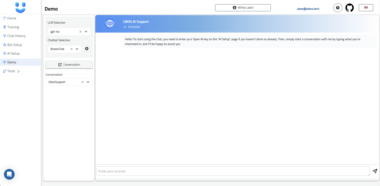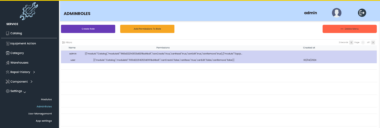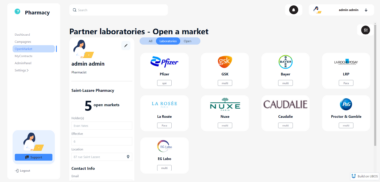MCP Finder Server: Discover and Integrate Model Context Protocol Servers
In the rapidly evolving landscape of Artificial Intelligence, the seamless integration of AI models with diverse data sources and tools is paramount. The Model Context Protocol (MCP) emerges as a pivotal standard, streamlining how applications provide context to Large Language Models (LLMs). At the heart of this paradigm shift lies the MCP Finder Server, a specialized tool designed to facilitate the discovery and integration of MCP server implementations.
The MCP Finder Server acts as a central directory, allowing AI models to search for and connect with other MCP servers listed in the awesome-mcp-servers repository. This centralized discovery mechanism significantly simplifies the process of integrating external data and functionalities into AI workflows.
Understanding the Model Context Protocol (MCP)
Before diving deeper into the MCP Finder Server, let’s first understand what MCP is and why it matters. MCP, or Model Context Protocol, is an open protocol that standardizes how applications provide context to LLMs. Think of it as a universal language that allows different AI models and data sources to communicate effectively. This standardization unlocks numerous benefits:
- Enhanced AI Model Capabilities: By providing AI models with access to relevant context, MCP enables them to perform more complex and nuanced tasks.
- Seamless Integration: MCP simplifies the integration of AI models with external data sources, tools, and services.
- Improved Interoperability: MCP ensures that different AI models and applications can work together seamlessly, regardless of their underlying architecture.
- Accelerated Development: MCP reduces the complexity of AI development, allowing developers to focus on building innovative solutions.
The MCP Finder Server is a critical component of the MCP ecosystem, enabling AI models to discover and utilize available MCP servers effortlessly.
Key Features of the MCP Finder Server
The MCP Finder Server boasts a range of features designed to streamline the discovery and integration of MCP servers:
- Search Functionality: The server allows users to search for MCP servers based on various criteria, including name, description, and tags. This makes it easy to find the right server for a specific use case.
- Filtering Capabilities: Users can filter MCP servers by specific tags, such as programming language (e.g., Python, TypeScript), OS compatibility (e.g., macOS, Windows, Linux), and functionality (e.g., Databases, Frameworks). This ensures that users can quickly narrow down the search results to the most relevant servers.
- Result Limiting: The server allows users to limit the number of results returned, preventing information overload and enabling efficient browsing.
Detailed Feature Breakdown:
- Advanced Search: Leverage text-based search to pinpoint servers by name, description keywords, or associated terms. This free-form search capability accelerates the discovery of niche or specialized MCP server implementations.
- Tag-Based Filtering: Utilize the extensive tagging system (e.g., ‘Databases’, ‘
’, ‘
’) to refine your search based on specific criteria like programming language, deployment environment (local vs. cloud), or functional domain.
- Result Pagination: Control the number of search results returned to manage information flow and focus on the most pertinent MCP servers for your application. The
limitparameter offers fine-grained control over result volume. - Smithery Integration: Seamlessly install MCP Finder Server for Claude Desktop automatically via Smithery, simplifying deployment and configuration. This streamlined installation process significantly reduces the barrier to entry.
- Manual Installation Option: For users preferring a more hands-on approach, the server can be manually installed via cloning the repository and using
npmfor dependency management.
Use Cases for the MCP Finder Server
The MCP Finder Server can be used in a variety of scenarios to enhance AI workflows:
- AI-Powered Data Integration: Connect AI models to diverse data sources by discovering and integrating relevant MCP servers. For example, an AI-powered financial analysis tool could use the MCP Finder Server to locate and connect to MCP servers that provide access to real-time stock market data.
- Intelligent Automation: Automate complex tasks by integrating AI models with external tools and services via MCP servers. Imagine an AI-driven marketing automation platform using the MCP Finder Server to find and connect to MCP servers that provide access to social media APIs.
- Personalized Experiences: Create personalized experiences by tailoring AI models to individual user needs and preferences. An AI-powered e-commerce platform could use the MCP Finder Server to discover and connect to MCP servers that provide access to customer data and preferences.
Let’s explore these use cases in greater detail:
- Dynamic Data Retrieval: Instead of hardcoding specific data source integrations into AI models, the MCP Finder Server enables dynamic discovery of data sources at runtime. This allows AI models to adapt to changing data landscapes and access the most relevant information.
- Modular AI Agent Architectures: Construct modular AI agent architectures where individual agents can discover and utilize specialized MCP servers to perform specific tasks. This promotes code reusability, simplifies maintenance, and facilitates the creation of complex, multi-agent systems.
- Context-Aware AI Applications: Develop context-aware AI applications that can adapt their behavior based on the available MCP servers. For example, an AI-powered travel assistant could use the MCP Finder Server to discover and connect to MCP servers that provide information about flights, hotels, and local attractions.
Installation and Usage
The MCP Finder Server can be installed and used in several ways:
Installation via Smithery
For a streamlined installation experience, you can use Smithery to automatically install the MCP Finder Server for Claude Desktop:
bash npx -y @smithery/cli install @yiye/mcp-finder-server --client claude
Manual Installation
Alternatively, you can manually install the server using the following steps:
Clone the repository:
bash git clone <repository_url>
Install dependencies:
bash npm install
Running the Server
Once installed, the server can be run in either production or development mode.
Production Mode:
Build the server:
bash npm run build
Run the server:
bash npm start
Development Mode:
bash npm run dev
Leveraging the find-mcp-servers Tool
The MCP Finder Server provides a single, powerful tool called find-mcp-servers for discovering MCP server implementations. This tool accepts the following parameters:
search(optional): Text to search for in server names, descriptions, or tags.tag(optional): Filter servers by tag (e.g., ‘Databases’, ‘’, ‘
’).
limit(optional, default 10): Maximum number of results to return.
By combining these parameters, you can precisely target your search and retrieve the most relevant MCP servers for your needs.
Tag Meanings Explained
The tagging system provides a concise way to categorize and filter MCP servers. Here’s a breakdown of the tag meanings:
– Python codebase
– TypeScript codebase
– Go codebase
– Rust codebase
- C# Codebase
- Java codebase
- Cloud Service
- Local Service
- Embedded Systems
– For macOS
– For Windows
- For Linux
Understanding these tags allows you to quickly identify servers that are compatible with your environment and written in your preferred programming language.
Integrating with UBOS: A Full-Stack AI Agent Development Platform
The MCP Finder Server is a valuable tool for developers building AI agents and applications. When integrated with a platform like UBOS, its capabilities are significantly amplified.
UBOS is a full-stack AI Agent Development Platform focused on bringing AI Agents to every business department. Our platform helps you orchestrate AI Agents, connect them with your enterprise data, build custom AI Agents with your LLM model and Multi-Agent Systems. Here’s how the MCP Finder Server complements the UBOS platform:
- Simplified AI Agent Development: UBOS provides a comprehensive set of tools and services for building, deploying, and managing AI agents. The MCP Finder Server simplifies the process of integrating these agents with external data sources and tools.
- Enhanced AI Agent Capabilities: By providing AI agents with access to a wider range of MCP servers, UBOS enables them to perform more complex and nuanced tasks.
- Accelerated Innovation: UBOS and the MCP Finder Server empower developers to rapidly prototype and deploy innovative AI solutions.
- Seamless Orchestration: UBOS excels at orchestrating complex AI workflows, and the MCP Finder Server ensures that these workflows can seamlessly integrate with diverse data sources and tools through standardized MCP interactions.
- Enterprise Data Connectivity: UBOS simplifies connecting AI Agents to enterprise data, and the MCP Finder Server expands these connectivity options by facilitating the discovery and utilization of relevant MCP servers.
- Custom AI Agent Building: UBOS empowers users to build custom AI Agents with their own LLM models. The MCP Finder Server enhances these custom agents by providing them with access to external knowledge and functionalities.
By leveraging the MCP Finder Server within the UBOS ecosystem, organizations can unlock the full potential of AI agents and drive innovation across their business.
Conclusion
The MCP Finder Server is an essential tool for anyone working with AI models and the Model Context Protocol. Its search, filtering, and result limiting capabilities streamline the discovery and integration of MCP servers, empowering developers to build more intelligent and versatile AI applications. When combined with a platform like UBOS, the MCP Finder Server becomes an even more powerful tool for driving AI innovation and transforming businesses.
By embracing the MCP standard and leveraging tools like the MCP Finder Server, we can unlock the true potential of AI and create a future where AI seamlessly integrates with our lives and empowers us to achieve more.
Finder Server
Project Details
- yiye/MCP-Finder-Server
- Last Updated: 4/18/2025
Recomended MCP Servers

A MCP server implementation for hyperbrowser
Examples of using E2B

Simple MCP server to provide my Local Cursor with access to add items to my MongoDB todo list

A Claude Model Context Protocol (MCP) implementation for some useful Transport NSW API endpoints.

Antrophics Model context protocol to edit powerpoint files
mcp server sopos open-api
Dify is an open-source LLM app development platform. Dify's intuitive interface combines AI workflow, RAG pipeline, agent capabilities,...


 From vibe coding to vibe deployment. UBOS MCP turns ideas into infra with one message.
From vibe coding to vibe deployment. UBOS MCP turns ideas into infra with one message.





